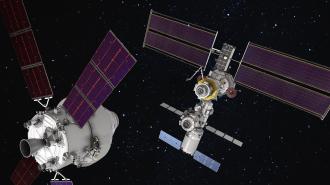NASA is developing a ChatGPT-style interface for future spacecraft, giving astronauts the ability to talk to the systems using natural language — and have the systems talk right back.
Space talk: In June 2018, a massive dust storm on Mars engulfed NASA’s Opportunity rover, cutting off communication with Earth. Eight months later, NASA announced an end to the rover’s 15-year Mars mission.
“The last message [NASA] received was basically, ‘My battery is low and it’s getting dark,’” tweeted science reporter Jacob Margolis after talking to NASA about the rover.
The internet went crazy over Opportunity’s poignant “last words,” but the rover didn’t really say them — its last message to Earth was written in coded data that NASA engineers had to interpret, just like every transmission before it.
“The idea is to get to a point where we have conversational interactions with space vehicles.”
Larissa Suzuki
The idea: If rovers and other spacecraft could communicate with NASA using the same natural language people use to talk to each other, it could ease interpretation — and thanks to advances in AI, we’re getting closer to that reality.
“It’s really not like science fiction any more,” said Larissa Suzuki, a visiting researcher at NASA, at a virtual meeting of the Institute of Electrical and Electronics Engineers (IEEE) on June 20.
What’s new? During her keynote speech at the IEEE’s Cognitive Communications for Aerospace Applications Workshop, Suzuki explained how NASA is developing an interface similar to OpenAI’s popular ChatGPT for future spacecraft and rovers.
This would let NASA scientists and astronauts communicate with the machines using natural language — instead of having to sift through technical manuals to find information on how to tell a rover to perform a certain maneuver, for example, they could just tell it.
“The idea is to get to a point where we have conversational interactions with space vehicles and they [are] also talking back to us on alerts, interesting findings they see in the solar system, and beyond,” said Suzuki.
NASA is developing an interface similar to OpenAI’s popular ChatGPT for future spacecraft and rovers.
Looking ahead: NASA engineers won’t have to wait too long to begin chatting it up with their spacecraft — according to Suzuki, an early version of the AI will be integrated into Lunar Gateway, a moon-orbiting space station set to launch as soon as November 2024.
Once online, it’s not hard to imagine NASA using the space station’s ability to “talk” to increase public awareness and engagement in the mission, too — they could just give the Gateway AI its own Twitter account and wait for it to drop gems like the one attributed to Opportunity.
We’d love to hear from you! If you have a comment about this article or if you have a tip for a future Freethink story, please email us at tips@freethink.com.
